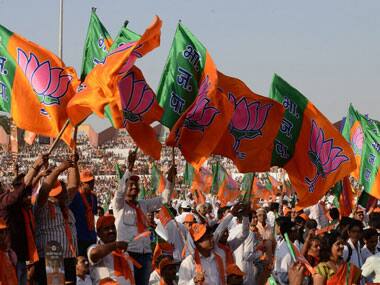Engineering defection from other parties to get a majority or running a minority government by ensuring abstention by legislators from other parties during the vote of confidence – short on numbers, these were the two options the BJP was left with if it wanted to form the government in Delhi. Neither was viable given in either case it would have been accused of subverting the democratic process through horse-trading or by other unfair means. That left the party with the third, and the least controversial, option: fresh election. Why did the party then take so long convey to the Lieutenant Governor that it was not interested in forming the government? While it has been attributed variously to under-confidence, lack of strong leadership in the state after Harsh Vardhan was made Union minister or sheer lack of sense of timing, in hindsight it does not look to be as big a tactical blunder it is being made out to be. There’s no reason for the party to be low on confidence after winning all seven parliamentary seats with thumping numbers; moreover, with the momentum with Narendra Modi, the party, as is being proved elsewhere in the country, can manage without strong faces to lead its election campaign. [caption id=“attachment_1785529” align=“alignleft” width=“380”]  Representational image. Agencies.[/caption] That leaves the question of timing. The dilly-dallying over a decision was deliberate. The party wanted to buy time, not to get its organizational or leadership issues in order, but to get done with more important challenges. Delhi, despite the noise it generates, is comparatively insignificant to other states from the political-electoral point of view. There’s the minor issue of ‘prestige’ involved in the elections here, but it could have waited till polls to other assemblies were over. After resounding victories in more significant states, the BJP is finally ready to focus on Delhi. To put it in short, the state figured low among the list of priorities of the party. To put it down to the threat of losing to AAP would be immature. The novelty factor in Kejriwal’s party has worn off and it is no more the entity that drew both the masses and the classes under a common umbrella. Corruption as an electoral issue has lost sheen and one-time followers are less inclined to allow the party to occupy moral high ground. There has been a sharp erosion of its support base after the party relinquished office after only 49 days in power. The upper and middle classes that backed AAP last year have abandoned it for the BJP. The jhuggi-jhopdis are the only areas where the AAP can throw a challenge to the latter. But that again is suspect. In existential crisis after several small rebellions and public criticism of the party’s leadership, the AAP needs the election more desperately than the BJP does. It needs to keep the restive cadre and local leaders, used to agitational politics, busy and together. After the general election the party has been largely idle, more in news for factional conflicts and ego tussles than intense activity on the ground. A long spell of inactivity threatens to cause the disintegration of the party. This being the situation of the major opposition, the BJP would have loved to prolong its misery by delaying the election. It has been doing precisely that. If elections are linked to the survival of AAP, it means stock-taking for the Congress. Down to eight seats after ruling the state for 15 years, the party would like to gauge the public mood afresh, particularly after Kejriwal’s party has been steadily losing ground. It has no hope making a big comeback, but the results would tell the party where it stands and how it needs to redraw its strategy for revival. The traditional Congress voters had shifted to the AAP in the assembly elections last year, there could a turnaround this time. It’s a long shot and the party realizes that. But it would still like a quick election to see how the AAP performs. There’s no reason why the BJP would oblige. The BJP, in no tearing hurry to jump into elections, has played its cards right in Delhi.
Engineering defection from other parties to get a majority or running a minority government by ensuring abstention by legislators from other parties during the vote of confidence – short on numbers, these were the two options the BJP was left with if it wanted to form the government in Delhi.
Advertisement
End of Article


)
)
)
)
)
)
)
)
)



